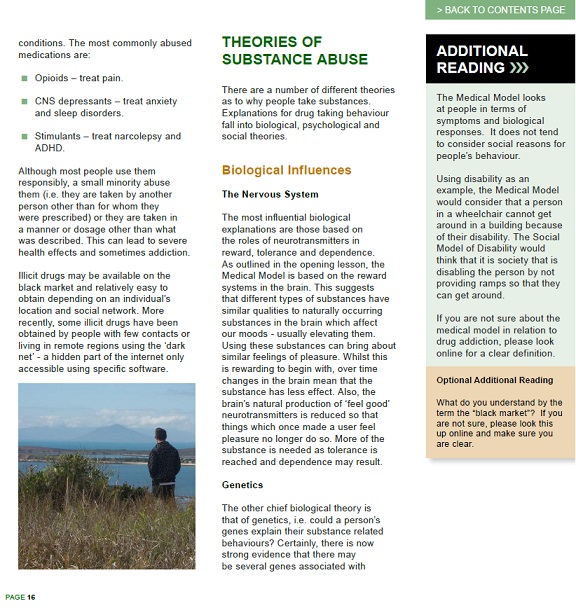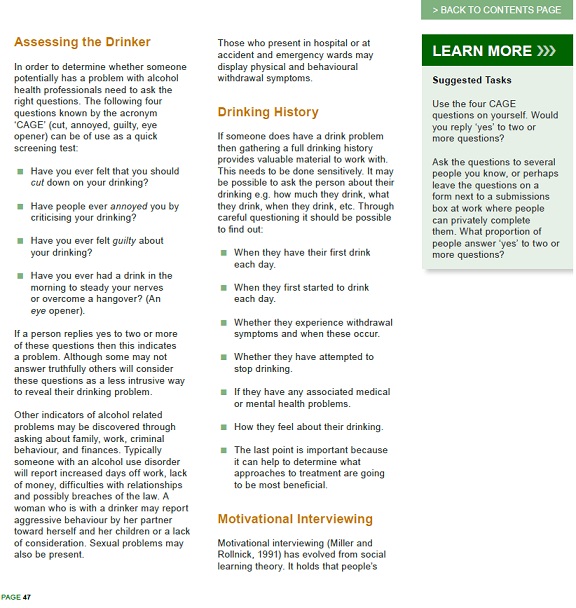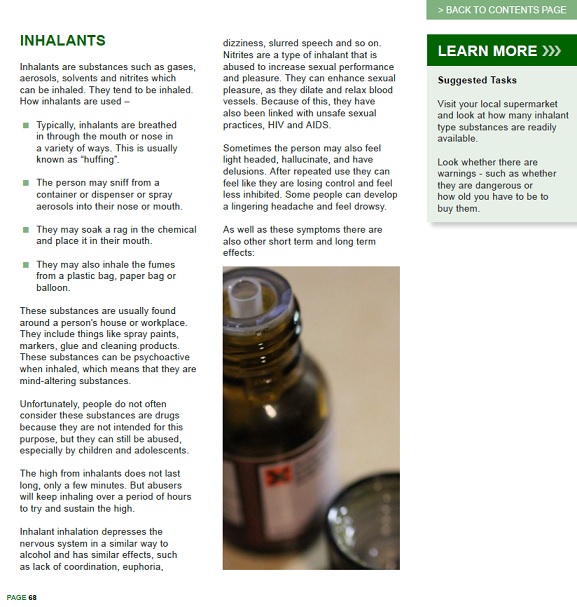Sneak Peek
Self Paced 20-hour course to help you how to counsel persons suffering from addiction.
Addictions are more than simply having a strong desire for something. They change an individual's behaviour so that they must satisfy their addiction. This is why the term 'dependence' is often used. Research using brain imaging has demonstrated that addictions alter brain structure and function. It's perhaps not surprising then that many people find it so difficult to overcome their addictions.
Addictions can cause immense unhappiness for those who have them, whether through personal experience or because friends or family suffer from them. This short course is designed to appeal to anyone who works with people who have problems with addictive behaviours from drugs and alcohol through to shopaholics. Many types of addiction are covered and the process of addiction is explained both behaviourally and physiologically. A variety of counselling methods and techniques are also reviewed so that students should be able to develop different solutions to help those whose lives are affected.
At the end of the course you will be able to describe the main addictive substances; you will understand how these chemicals act in the body, what the effects are and the behaviour changes. You will also learn where to find resources and services to help those drug addicts.
Our 20-hour courses are self paced and will help you understand a topic in a short amount of time. You can work through the course when you like- test yourself with mini-tests along the way. There are extra case studies or research you can undertake if you would really like to get into the topic. Once you have completed the lessons and self assessment tasks, there is a final exam undertaken online- you can then download your personalised certificate.
Course content - What do you learn?
Lesson 1 DRUG AND ADDICTION COUNSELLING
Neurotransmitters and Neurons
The Reward System
Tolerance
Withdrawal
Dependence
Substance Abuse
Review what you have been learning
Lesson 2 TYPES of ADDICTION
Biological Influences
Psychological Influences
Alcohol
Tobacco
Caffeine
Behavioural Addictions
Lesson 3 ADDICTIONS & COMORBIDITY
Social Anxiety
Negative Reinforcement
Personality Issues
Wernicke-Korsakoff’s Syndrome
Cognitive Deficits
Alcoholic Hallucinosis
Suicide Risk
Cannabis Use
Other Substances
Lesson 4 ALCOHOL USE AND DEPENDENCE
Foetal Alcohol Syndrome
Alcohol Withdrawal
Driving
How Long Does Alcohol Stay in Your Bloodstream?
Machinery/Accidents at Work
Hospitalisations
Relationships
Crimes
Physical Health
Mortality
Lesson 5 COUNSELLING THE INDIVIDUAL WITH ALCOHOL RELATED PROBLEMS
Assessing the Drinker
Drinking History
Motivational Interviewing
Drinking Diary
Hazardous Drinking
Higher Risk or Harmful Drinking
Dependent Drinking
Topirimate
Baclofen
Naltrexone
Disulfiram (more commonly known as Antabuse)
Campral
Ondansetron (Zofran)
Chantix
Gabapentin
Extended Brief Intervention
Family Therapy
Group Work
Multicultural Differences
Lesson 6 SUBSTANCE ABUSE AND DEPENDENCE
Caffine
Cannabis
Hallucinogens
Inhalants
Heroin
Sedatives
Anti Anxiety Drugs
Stimulants
Cocaine
Metaphetamines
Club Drugs
Tobacco
Lesson 7 COUNSELLING THE INDIVIDUAL WITH SUBSTANCE RELATED PROBLEMS
Motivational Enhancement Therapy
Medication
Behavioural Therapy
Residential Treatments
Other Treatments
Cocaine Addiction
Lesson 8 COUNSELLING FOR ADDICTIVE BEHAVIOURS
National Problem Gambling Clinics (UK)
Gamblers Anonymous
Gamcare (UK)
Shopping Addiction/Omniomania
Lesson 9 THE HEALTHCARE TEAM SUPPORT NETWORKS AND SPECIFIC GROUPS
Doctor
Drugs Key worker
Government, Charity and Private Treatments
Outreach services
ECT – Electro Convulsive Therapy
Family Support
Review what you have been learning
FINAL ASSESSMENT
Learn about Different Types of Addiction First then Learn to Help Addicts Deal with their Addiction
The types of substances which people may become dependent upon
include illicit drugs (cannabis, heroin, cocaine, etc.) and legal drugs
(alcohol, tobacco, caffeine, over-the-counter medications and
prescription medications). There are also behaviours which
induce similar highs to substances and which can also become addictive,
which we’ll come to later. (However, whilst some drugs are illegal in
some countries, they are not in others.)
DRUGS OF ADDICTION
There are many different substances which people can become dependent
upon. Anyone who develops a use disorder to a substance will use that
substance in excess. Currently, those substances for which there are
recognised mental health disorders include:
- Cannabis
- Hallucinogens
- Inhalants
- Opioids (synthetic medications similar to opiates)
- Sedatives, Hypnotics and Anxiolytics
- Stimulants
- Alcohol
- Tobacco
- Caffeine
- Other, unknown substances
Whilst many people often use more than one substance, a diagnosis is
usually made on the basis of the substance which is considered the most
important one to the person. The DSM-IV used the term ‘poly-substance
related disorder’ to refer to those who have more than one prevalent
substance use disorder or who use indiscriminately, but the most
recent DSM suggests to record each diagnosis of a substance use disorder
separately.
Hallucinogens include psychedelic drugs like LSD (lysergic acid
dyethylemide) and mescaline. Inhalants are drugs which are sniffed. They
can include drugs such as amyl nitrate which is volatile at room
temperature when exposed to air, as well as aerosol and glue vapours
which are often sniffed from polythene bags.
Opioids are synthetic medications which are used to treat pain.
Examples include oxycodone, hydrocodone and hydromorphone. These are
very similar to opiates like morphine and heroin in their action on the
nervous system but they are not derived from opium. Sedatives, hypnotics
and anxiolytics are depressants - they are said to produce a ‘downer’.
Sedatives are tranquilisers intended to reduce overactivity or
irritability. Benzodiazepines are an example. Alcohol produces similar
effects.
Hypnotics are intended to induce sleep and are also known as sleeping
pills. Anxiolytics are intended to reduce anxiety symptoms.
Stimulants include many drugs which produce an ‘upper’ or stimulating
effect on the central nervous system. Effects include wakefulness,
alertness and increased heart rate. Many drugs like caffeine for
instance can induce these effects but from a substance use disorder
perspective this group includes
the likes of amphetamines and cocaine.
WHY DO PEOPLE TAKE DRUGS?
When we look at addictions to substances one of the first questions
which springs to mind is “Why do people take drugs?” As we have already
seen, one of the reasons is because they can get ‘high’ but is that why
all people take drugs? The answer, of course, is no. In fact, the first
time of taking a substance such as nicotine, opiates or alcohol can be
dysphoric and even cause nausea, yet people often take it again.
People may take drugs to overcome psychological or physical pain.
They may take them to treat diseases, or to try and gain insight into
the human condition through altered states of consciousness. Sometimes
people want to move from a depressed state of mind to a less depressed
one or from a negative state of mind to a less negative one. The effects
of any given drug for each person can be quite different.
Another reason people may take drugs is because they are available.
Some, like alcohol and nicotine, are freely and legally available.
Others have developed dependence to prescribed medications. In
particular, many people became addicted to opioids and barbiturates
prescribed by doctors in the early part of the twentieth century, and
later to benzodiazepines.
How does this course work?
You can enrol at any time.
Once you have paid for the course, you will be able to start straight away.
Study when and where you like. Work through at your own pace.
You can download your study-guide to your smart phone, tablet or laptop to read offline.
There are automated self-assessment tests you can complete at the end of each lesson. You can attempt these as many times as you wish and each time, upon completion, you can see your results. You will need internet access to complete the self assessment tests.
At the end of the course, you are presented with a large assessment which can be attempted online, anywhere, anytime. If you achieve a 60% pass in the exam; you immediately receive a downloadable certificate of completion with your name on it. If you do not achieve a 60% pass rate, you can contact us to re-sit your exam (email- [email protected]).
Contact us at anytime if you have any issues with the course: [email protected].
Example Pages from the Study Guide


